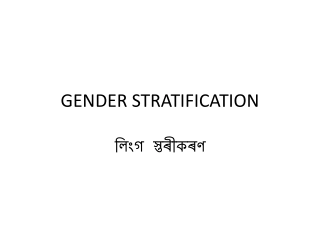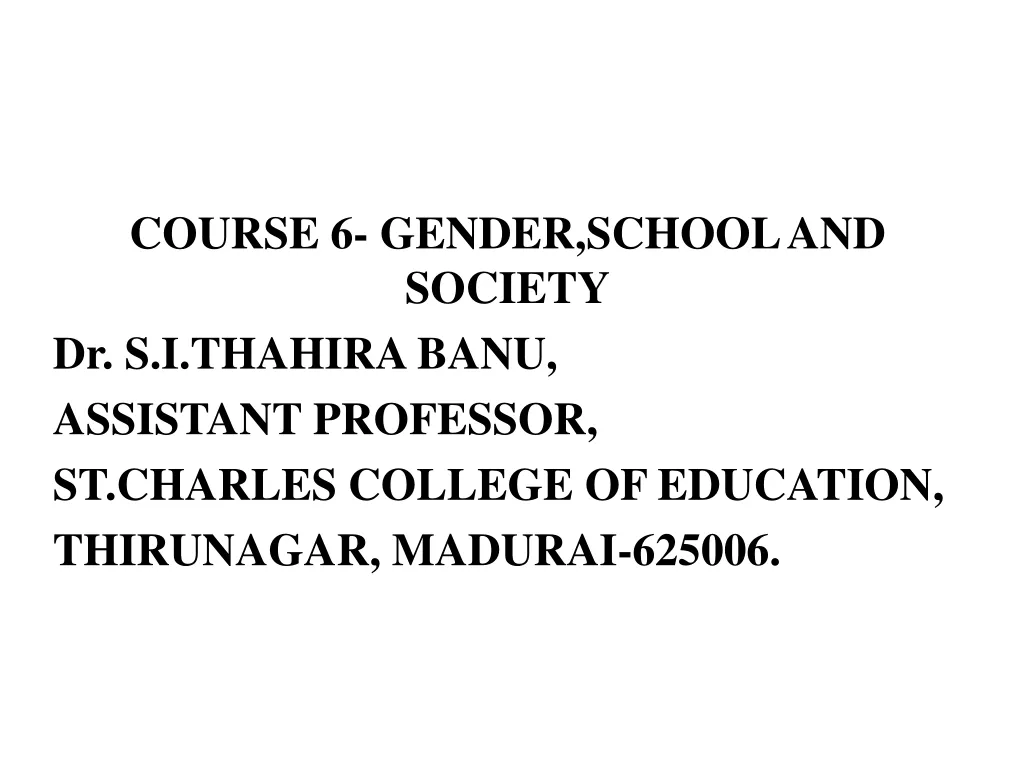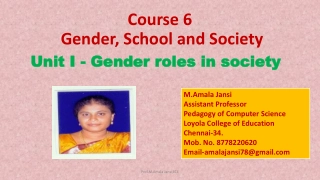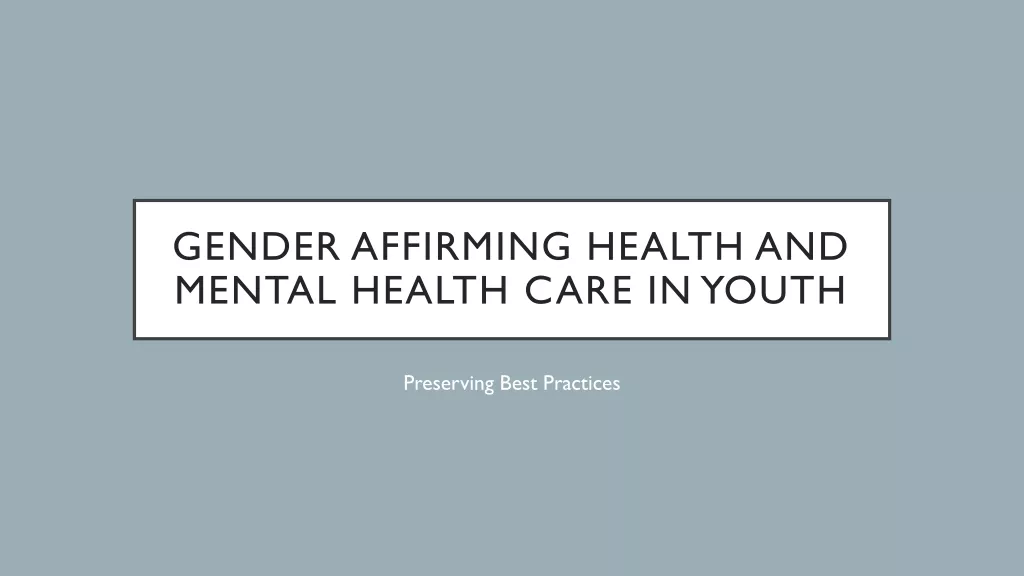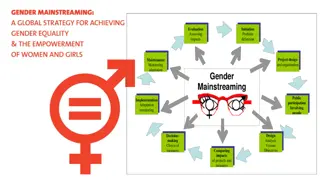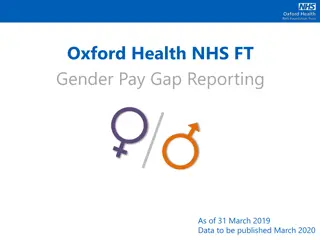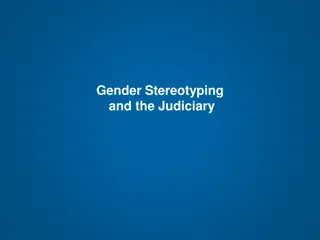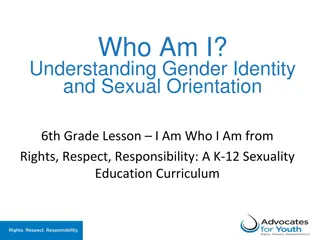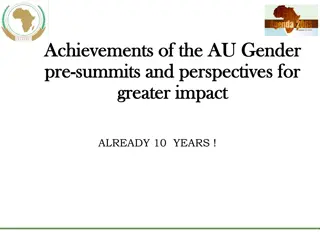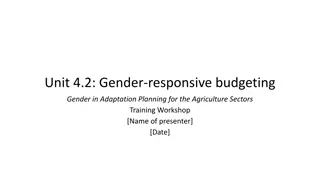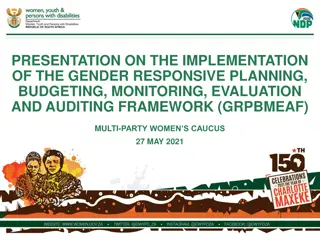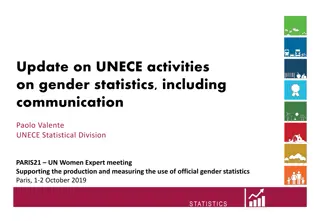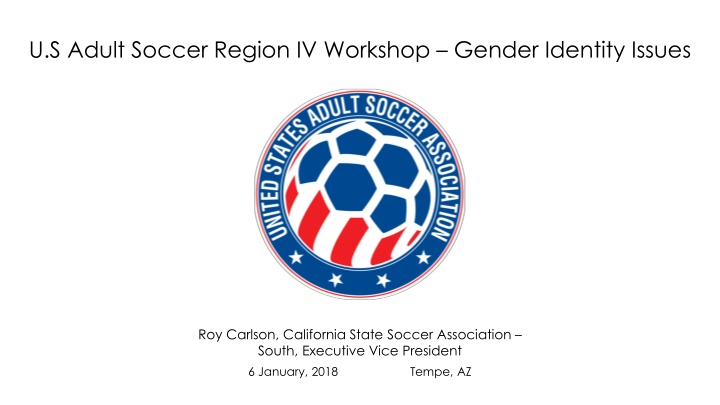
Gender Identity and Sexual Orientation: A Comprehensive Guide
Explore the complexities of gender identity, sexual orientation, and related terms in this informative glossary. Learn about the differences between sex, gender identity, gender expression, and sexual orientation, and gain insights into the experiences of transgender individuals. Expand your knowledge and understanding of diverse identities with practical explanations and examples.
Download Presentation

Please find below an Image/Link to download the presentation.
The content on the website is provided AS IS for your information and personal use only. It may not be sold, licensed, or shared on other websites without obtaining consent from the author. If you encounter any issues during the download, it is possible that the publisher has removed the file from their server.
You are allowed to download the files provided on this website for personal or commercial use, subject to the condition that they are used lawfully. All files are the property of their respective owners.
The content on the website is provided AS IS for your information and personal use only. It may not be sold, licensed, or shared on other websites without obtaining consent from the author.
E N D
Presentation Transcript
U.S Adult Soccer Region IV Workshop Gender Identity Issues Roy Carlson, California State Soccer Association South, Executive Vice President 6 January, 2018 Tempe, AZ
GLOSSARY OF TERMS Sex - The classification of a person as male or female. At birth, infants are assigned a sex, usually based on the appearance of their external anatomy. (This is what is written on the birth certificate.) A person's sex, however, is actually a combination of bodily characteristics including: chromosomes, hormones, internal and external reproductive organs, and secondary sex characteristics. Gender Identity - A person's internal, deeply held sense of their gender. For transgender people, their own internal gender identity does not match the sex they were assigned at birth. Most people have a gender identity of man or woman (or boy or girl). For some people, their gender identity does not fit neatly into one of those two choices (see non-binary and/or genderqueer below.) Unlike gender expression (see below) gender identity is not visible to others. Gender Expression - External manifestations of gender, expressed through a person's name, pronouns, clothing, haircut, behavior, voice, and/or body characteristics. Society identifies these cues as masculine and feminine, although what is considered masculine or feminine changes over time and varies by culture. Typically, transgender people seek to align their gender expression with their gender identity, rather than the sex they were assigned at birth.
GLOSSARY OF TERMS (cont.) Sexual Orientation - Describes a person's enduring physical, romantic, and/or emotional attraction to another person. Gender identity and sexual orientation are not the same. Transgender people may be straight, lesbian, gay, bisexual, or queer. For example, a person who transitions from male to female and is attracted solely to men would typically identify as a straight woman. Transgender (adj.) - An umbrella term for people whose gender identity and/or gender expression differs from what is typically associated with the sex they were assigned at birth. People under the transgender umbrella may describe themselves using one or more of a wide variety of terms - including transgender. Some of those terms are defined below. Use the descriptive term preferred by the person. Many transgender people are prescribed hormones by their doctors to bring their bodies into alignment with their gender identity. Some undergo surgery as well. But not all transgender people can or will take those steps, and a transgender identity is not dependent upon physical appearance or medical procedures. Transsexual (adj.) - An older term that originated in the medical and psychological communities. Still preferred by some people who have permanently changed - or seek to change - their bodies through medical interventions, including but not limited to hormones and/or surgeries. Unlike transgender, transsexual is not an umbrella term. Many transgender people do not identify as transsexual and prefer the word transgender. It is best to ask which term a person prefers. If preferred, use as an adjective: transsexual woman or transsexual man.
GLOSSARY OF TERMS (cont.) Trans - Used as shorthand to mean transgender or transsexual - or sometimes to be inclusive of a wide variety of identities under the transgender umbrella. Because its meaning is not precise or widely understood, be careful when using it with audiences who may not understand what it means. Avoid unless used in a direct quote or in cases where you can clearly explain the term's meaning in the context of your story. Cross-dresser - While anyone may wear clothes associated with a different sex, the term cross-dresser is typically used to refer to men who occasionally wear clothes, makeup, and accessories culturally associated with women. Those men typically identify as heterosexual. This activity is a form of gender expression and not done for entertainment purposes. Cross-dressers do not wish to permanently change their sex or live full-time as women. Replaces the term "transvestite". Transition - Altering one's birth sex is not a one-step procedure; it is a complex process that occurs over a long period of time. Transition can include some or all of the following personal, medical, and legal steps: telling one's family, friends, and co-workers; using a different name and new pronouns; dressing differently; changing one's name and/or sex on legal documents; hormone therapy; and possibly (though not always) one or more types of surgery. The exact steps involved in transition vary from person to person. Avoid the phrase "sex change". Sex Reassignment Surgery (SRS) - Also called Gender Confirmation Surgery (GCS). Refers to doctor-supervised surgical interventions, and is only one small part of transition (see transition above). Avoid the phrase "sex change operation." Do not refer to someone as being "pre-op" or "post-op." Not all transgender people choose to, or can afford to, undergo medical surgeries. https://www.glaad.org/reference/transgender
FAQ FROM UNITED SOCCER COACHES I want to create a positive, inclusive environment for all players, but I don t understand what it means to be transgender. The first thing to understand is the basic terminology used to discuss gender. A person s sex is determined most often at birth; it s based on physical sex characteristics. A person s gender refers to their self-perception how they identify mentally and emotionally. The term transgender refers to people whose gender identity or expression does not match their physical sex characteristics, or does not fit within social norms. No one can assign a gender identity to another person. We all define our own gender, and our definitions are as diverse as we all are. Like all athletes, transgender soccer players benefit from positive environments where people are encouraged to be themselves, and where hurtful language and stereotypes are challenged. Gender is often a fraught topic, particularly in sports. There are clear social norms for what it means to be a boy, girl, man, or "woman. People not fitting into these boxes are often stigmatized. For example, a boy who is called a sissy receives the message that he is less than a male. This affects every athlete not just transgender ones. You can support all players by stepping in whenever anyone uses a gender stereotype. Make it clear that every person is worthwhile, and all are welcome. https://unitedsoccercoaches.org/web/web/Membership/Communities/LGBT_FAQ.aspx
INTERNATIONAL OLYMPIC COMMITTEE TRANSGENDER GUIDELINES E. To require surgical anatomical changes as a pre-condition to participation is not necessary to preserve fair competition and may be inconsistent with developing legislation and notions of human rights. A. Since the 2003 Stockholm Consensus on Sex Reassignment in Sports, there has been a growing recognition of the importance of autonomy of gender identity in society, as reflected in the laws of many jurisdictions worldwide. F. Nothing in these guidelines is intended to undermine in any way the requirement to comply with the World Anti-Doping Code and the WADA International Standards. B. There are also, however, jurisdictions where autonomy of gender identity is not recognized in law at all. G. These guidelines are a living document and will be subject to review in light of any scientific or medical developments. C. It is necessary to ensure insofar as possible that trans athletes are not excluded from the opportunity to participate in sporting competition. D. The overriding sporting objective is and remains the guarantee of fair competition. Restrictions on participation are appropriate to the extent that they are necessary and proportionate to the achievement of that objective.
INTERNATIONAL OLYMPIC COMMITTEE (cont.) In this spirit, the IOC Consensus Meeting agreed the following guidelines to be taken into account by sports organizations when determining eligibility to compete in male and female competition: 1. Those who transition from female to male are eligible to compete in the male category without restriction. 2. Those who transition from male to female are eligible to compete in the female category under the following conditions. 2.1. The athlete has declared that her gender identity is female. The declaration cannot be changed, for sporting purposes, for a minimum of four years. 2.2. The athlete must demonstrate that her total testosterone level in serum has been below 10 nmol/L for at least 12 months prior to her first competition (with the requirement for any longer period to be based on a confidential case-by-case evaluation, considering whether or not 12 months is a sufficient length of time to minimize any advantage in women s competition). 2.3. The athlete's total testosterone level in serum must remain below 10 nmol/L throughout the period of desired eligibility to compete in the female category. 2.4. Compliance with these conditions may be monitored by testing. In the event of non-compliance, the athlete s eligibility for female competition will be suspended for 12 months.
INTERNATIONAL OLYMPIC COMMITTEE (cont.) 3. Hyperandrogenism in female athletes In response to the interim award dated 24 July 2015 in Chand v AFI and IAAF CAS 2014/A/3759, the IOC Consensus Meeting recommended: Rules should be in place for the protection of women in sport and the promotion of the principles of fair competition. The IAAF, with support from other International Federations, National Olympic Committees and other sports organisations, is encouraged to revert to CAS with arguments and evidence to support the reinstatement of its hyperandrogenism rules. To avoid discrimination, if not eligible for female competition the athlete should be eligible to compete in male competition.
FIFA CODE OF ETHICS 2012 1 Scope of applicability This Code shall apply to conduct that damages the integrity and reputation of football and in particular to illegal, immoral and unethical behaviour. The Code focuses on general conduct within association football that has little or no connection with action on the field of play. 2 Persons covered This Code shall apply to all officials and players as well as match and players agents who are bound by this Code on the day the infringement is committed. 23 Non-discrimination Persons bound by this Code may not offend the dignity or integrity of a country, private person or group of people through contemptuous, discriminatory or denigratory words or actions on account of race, skin colour, ethnic, national or social origin, gender, language, religion, political opinion or any other opinion, wealth, birth or any other status, sexual orientation or any other reason.
FIFA DISCIPLINARY CODE 2017 3 Scope of application: natural and legal persons The following are subject to this code: a) associations; b) members of associations, in particular the clubs; c) officials; d) players; e) match officials; f) licensed match and players agents; g) anyone with an authorisation from FIFA, in particular with regard to a match, competition or other event organised by FIFA; h) spectators. 1 Object This code describes infringements of the rules in FIFA regulations, determines the sanctions incurred, regulates the organisation and function of the bodies responsible for taking decisions and the procedures to be followed before these bodies. 2 Scope of application: substantive law This code applies to every match and competition organised by FIFA. Beyond this scope, it also applies if a match official is harmed and, more generally, if the statutory objectives of FIFA are breached, especially with regard to forgery, corruption and doping. It also applies to any breach of FIFA regulations that does not fall under the jurisdiction of any other body.
FIFA DISCIPLINARY CODE 2017 (cont.) 10 Sanctions common to natural and legal persons Both natural and legal persons are punishable by the following sanctions: a) warning; b) reprimand; c) fine; d) return of awards. 12 Sanctions applicable to legal persons The following sanctions are applicable only to legal persons: a) transfer ban; b) playing a match without spectators; c) playing a match on neutral territory; d) ban on playing in a particular stadium; e) annulment of the result of a match; f) expulsion; g) forfeit; h) deduction of points; i) relegation to a lower division. 11 Sanctions applicable to natural persons The following sanctions are applicable only to natural persons: a) caution; b) expulsion; c) match suspension; d) ban from dressing rooms and/or substitutes bench; e) ban from entering a stadium; f) ban on taking part in any football-related activity.
FIFA DISCIPLINARY CODE 2017 (cont.) 57 Offensive behaviour and fair play Anyone who insults someone in any way, especially by using offensive gestures or language, or who violates the principles of fair play or whose behaviour is unsporting in any other way may be subject to sanctions in accordance with art. 10 ff. 58 Discrimination 1. a) Anyone who offends the dignity of a person or group of persons through contemptuous, discriminatory or denigratory words or actions concerning race, colour, language, religion or origin shall be suspended for at least five matches. Furthermore, a stadium ban and a fine of at least CHF 20,000 shall be imposed. If the perpetrator is an official, the fine shall be at least CHF 30,000. b) Where several persons (officials and/or players) from the same club or association simultaneously breach par. 1 a) or there are other aggravating circumstances, the team concerned may be deducted three points for a first offence and six points for a second offence; a further offence may result in relegation to a lower division. In the case of matches in which no points are awarded, the team may be disqualified from the competition.
FIFA DISCIPLINARY CODE 2017 (cont.) 58 Discrimination (cont.) 2. a) Where supporters of a team breach par. 1 a) at a match, a fine of at least CHF 30,000 shall be imposed on the association or club concerned regardless of the question of culpable conduct or culpable oversight. b) Serious offences may be punished with additional sanctions, in particular an order to play a match behind closed doors, the forfeit of a match, a points deduction or disqualification from the competition. 3. Spectators who breach par. 1 a) of this article shall receive a stadium ban of at least two years.
TED STEVENS OLYMPIC AND AMATEUR SPORTS ACT 36 U.S.C. 220522(a)(8) Ted Stevens Olympic and Amateur Sports Act 36 U.S.C. 220522(a)(8) provides an equal opportunity to amateur athletes, coaches, trainers, managers, administrators, and officials to participate in amateur athletic competition, without discrimination on the basis of race, color, religion, sex, age, or national origin, and with fair notice and opportunity for a hearing to any amateur athlete, coach, trainer, manager, administrator, or official before declaring the individual ineligible to participate.
U.S OLYMPIC COMMITTEE POLICY V. Commitment to Integrity The USOC is committed to honesty and integrity as the cornerstone of our activities. In turn, the USOC expects you to conduct yourself in an ethical and legal manner as a representative of the USOC. This requires that you: Respect the rights of all individuals to fair treatment and equal opportunity, free from discrimination or harassment of any type, including, without limitation discrimination on the basis of race, color, religion, sex, sexual orientation, gender identity, age, national origin or otherwise.1 1. It is acknowledged that, as to gender and gender identity, this prohibition on discrimination does not extend to decisions on eligibility and classification for the purposes of sport competition; such decisions may well, for example, be based on gender for any particular event.
U.S SOCCER, AND ALL THAT TRANS JAZZ By BTL Staff | March 7, 2013 | Entertainment, Sports By Dan Woog Born a male, Jazz began to live as a girl at a young age. Thanks to supportive parents, she was well-adjusted and happy except for one thing. For more than two years, the Florida Youth Soccer Association prohibited her from competing as a female player. Her birth certificate said she was a boy. Her passport called her a boy. FYSA would not budge. Jazz and her parents took their case up through various administrative levels. When it got to the US Soccer Federation, the board of directors almost unanimously agreed to let her play as a girl. Then, US Soccer set about devising a formal policy, to cover future transgender players, too.
MINUTES UNITED STATES SOCCER FEDERATION, INC. TASK FORCE ON TRANSGENDER PLAYER REGISTRATION BOARD OF DIRECTORS MEETING Dr. Robert S. Contiguglia updated the Board on the proposed inclusion policy created by the task force to allow transgendered players to participate in soccer with the gender team with which they identify. After discussion, it was MOVED to adopt the policy. The policy PASSED. TAMPA, FLA. JUNE 8, 2012 1:00 P.M. ET
USSF BYLAWS 2017 Bylaw 105 - Section 2. The Federation and its members shall comply with all applicable laws governing nondiscrimination and shall be open to membership without discrimination on the basis of race, color, religion, national origin, citizenship, disability, age, sex, sexual orientation, gender identity, or veteran status. Bylaw 105 - Section 3. The Federation shall provide equal opportunity to athletes, coaches, trainers, managers, officials, and administrators to participate in amateur soccer competitions. The Federation and its members shall not discriminate on the basis of race, color, religion, national origin, disability, age, sex, sexual orientation, gender identity, or veteran status; except that the Federation and its members may have rules for team formation and soccer competitions that classify players and teams based on age, sex, citizenship, disability, amateur status, competitive ability, or as otherwise mandated by FIFA. Bylaw 201 - ELIGIBILITY Membership in the Federation is open to all soccer organizations and all soccer players, coaches, trainers, managers, administrators and officials without discrimination on the basis of race, color, religion, national origin, citizenship, disability, age, sex, sexual orientation, gender identity, or veteran status.
USSF POLICY MANUAL 2017 Policy 601-5 Section 6. Inclusion Policy A. To clarify the Bylaws, membership of the Federation is open to all soccer organizations and all soccer players, coaches, trainers, managers, administrators and officials without discrimination on the basis of race, color, religion, age, sex, sexual orientation, gender identity, gender expression or national origin. B. For the purposes of registration on gender-based amateur teams, a player may register with the gender team with which the player identifies, and confirmation sufficient for guaranteeing access shall be satisfied by documentation or evidence that shows the stated gender is sincerely held, and part of a person s core identity. Documentation satisfying the herein stated standard includes, but is not limited to, government- issued documentation or documentation prepared by a health care provider, counselor, or other qualified professional not related to the player. C. This policy shall not apply to the Federation s National Teams programs, but application of this or a similar policy shall be re-evaluated at such time as FIFA addresses the issue. D. This policy shall not apply to Professional Leagues.
U.S ADULT SOCCER Bylaw 201 ELIGIBILITY The membership of USASA is open to all soccer organizations and all soccer players, coaches, trainers, managers, administrators and officials without discrimination on the basis of race, color, religion, age, sex or national origin.
THE FOOTBALL ASSOCIATION Policy on Trans People in Football 2014 1. Introduction Football belongs to, and should be enjoyed by, anyone who wants to participate in it. The Football Association (The FA) regulates the participation of competitors in football matches and domestic competitions as set out in The Rules of The Football Association (The FA Rules). It is The FA s firm view that gender identity should not be a barrier to participation in football. The FA is intent on making football a lifelong experience, and ensuring the inclusion and safety of participants. The FA has produced this policy to set out its position on transgender and transsexual people playing football.
THE FOOTBALL ASSOCIATION (cont.) Policy on Trans People in Football 2014 2. Participating in sport and in our case football has physical, psychological and social benefits and The FA is committed to promoting Football for Everyone. 2. The FA has undertaken a review of its 2007 Policy, which adopted the International Olympic Committee s position on transgender athletes as set out in the Stockholm Statement of May 2004. Background 3. The FA has given careful consideration to the Sports Council Equality Group Guidance for National Governing Bodies of Sport on Transsexual People and Competitive Sport and is pleased to adopt its recommendations to provide an inclusive environment which is supportive of and welcoming to trans people in football. As part of its review The FA has also sought the input and guidance of a specialist trans organisation. 4. The FA s policy is based on the fact that during the growth period, leading up to puberty, there is little difference in male and female strength development. Mixed football is allowed until the U16 age group and under 16 s are entitled to play in boys or girls teams regardless of their natal sex.
THE FOOTBALL ASSOCIATION (cont.) Policy on Trans People in Football 2014 2. Background (cont.) 5. However, hormonal changes brought about by puberty may result in: a. safety issues, due to a general distinction between males and females in sport as a result of different muscle strength caused by testosterone; and and also have b. fair play issues, due potentially to differences between the sexes, and the fact that oestrogen testosterone which is often taken as part of an individual s gender reassignment, can physical effects which may lead to competitive advantage. in 6. For this reason, it is necessary to have in place a fair and considered policy to allow participation for all football, and ensure fair competition and the safety of all those on the field. govern Union and references to 7. This policy governs participation in domestic football and competitions governed by The FA. It does not 1) participation in any football or domestic competitions that are not governed by The FA; or 2) international football; or 3) international competitions governed by F d ration Internationale de Football Association (FIFA) or of European Football Associations (UEFA) or the International Olympics Committee (IOC) football throughout this policy should be understood in this context.
THE FOOTBALL ASSOCIATION (cont.) Policy on Trans People in Football 2014 3. Gender within football Football is a gender affected sport of a competitive nature where the physical strength, stamina or physique of average persons of one sex could put them at a disadvantage compared to average persons of the other sex as competitors in a football match. English law provides that because of this, separate sporting competitions can be organised for men and women. For children, the position is slightly different and further details are set out below. The general position is that the participation of trans people in competitive sports cannot be restricted unless it is strictly necessary to pursue a legitimate aim, namely securing fair competition and safety of other competitors. From the start of the 2014-15 season, FA Rule C4(A)(v) on mixed football provides that a child in the age ranges from Under 7 to Under 16 may play in a match involving boys and girls. Taking into account the age and stage of development of children who are likely to be competitors, FA Rule J(3) provides that players in a match outside of these age ranges must be of the same gender.
THE FOOTBALL ASSOCIATION (cont.) Policy on Trans People in Football 2014 4. What does gender reassignment mean? Under the Equality Act 2010, a person has the characteristic of gender reassignment if the person is proposing to undergo, is undergoing or has undergone a process (or part of a process) for the purpose of reassigning that person s sex by changing physiological or other attributes of sex. A reference to a transsexual person is a reference to a person who has the characteristic of gender reassignment. The reassignment of a person s gender may include undergoing medical gender reassignment treatments. However, it is not necessary for somebody to have undergone medical treatment in order to have the characteristic of gender reassignment. A transsexual person may or may not be proposing to undergo, be in the process of undergoing, or have completed a reassignment of their sex. Gender reassignment is a personal process (that is, moving away from one s birth sex to the preferred/affirmed gender), rather than a medical process. Gender reassignment is one of 9 protected characteristics under the Equality Act 2010, and as such transsexual people are protected against discrimination. The Gender Recognition Act 2004 also makes clear that the trans status of a person is confidential.
THE FOOTBALL ASSOCIATION (cont.) Policy on Trans People in Football 2014 5. The FA s policy on trans people wishing to play football in their affirmed gender is as follows: The FA s policy Under 16 1. Pursuant to FA Rule C4(A)(xiii) on mixed football, any person playing football in the age ranges Under 7 to Under 16 may play in a match involving boys and girls, without restriction. There are therefore no conditions regarding any individual playing in a match under their reassigned/affirmed gender in these age ranges. 16 and over players (Adult players) 2. Pursuant to FA Rule J3 on mixed football, any players playing in an age range above the Under 16 age range must be of the same gender. 3. However, an individual may be eligible for participation in their affirmed gender. This will be subject to the approval of The FA on a case by case basis; the Clearance Procedure is set out below. 4. In reaching a decision, The FA will have regard to the following two factors: (1) the safety of the applicant and fellow players, and (2) the need to ensure fair play and fair competition.
THE FOOTBALL ASSOCIATION (cont.) Policy on Trans People in Football 2014 5. The FA s policy (cont.) 16 and over players (Adult players) (cont.) 5. When considering a trans player s application, The FA will make a presumption that an individual s application will be approved if he or she is able to satisfy the hormone-based requirements and provide the evidence set out below. If these requirements are met, The FA will only refuse an application if The FA decides in its absolute discretion that it is necessary to refuse an application to ensure (1) the applicant s and fellow players safety and/or (2) fair competition.
THE FOOTBALL ASSOCIATION (cont.) Policy on Trans People in Football 2014 Transsexual male (female-to-male transsexual person) REQUIREMENT Hormone therapy results in blood testosterone levels within natal male range EVIDENCE Individual case-by-case review Medical information/records demonstrate hormone therapy administered in a verifiable manner Blood testosterone within range for an appropriate length of time so as to minimise any potential advantage Hormone treatment to be verified annually Proof of ID required is identical to that required of all players i.e. passport or driving licence.
THE FOOTBALL ASSOCIATION (cont.) Policy on Trans People in Football 2014 Transsexual female (male-to-female transsexual person) EVIDENCE REQUIREMENT Hormone therapy OR Gonadectomy results in blood testosterone within natal female range Individual case-by-case review Medical information/records demonstrate hormone therapy administered in a verifiable manner Blood testosterone within natal female range for an appropriate length of time so as to minimise any potential advantage Hormone treatment to be verified annually Proof of ID required is identical to that required of all players i.e. passport or driving licence. 6. If a trans person has not undergone or is not undergoing hormone therapy or gonadectomy, The FA will consider their application taking into consideration the two requirements to ensure (1) the applicant s and fellow players safety and (2) fair competition.
THE FOOTBALL ASSOCIATION (cont.) Policy on Trans People in Football 2014 Clearance Procedure 7. All applications for clearance for an Adult player to play in their affirmed gender must be passed to The FA s Equality Manager. The FA s Equality Manager will then notify the Head of Medical Services, who may pass on the request within The FA s Medical Services team as appropriate and/or (in both cases) a medical representative appointed by The FA. All personal and sensitive information will be handled sensitively and confidentially in accordance with the provisions of the Data Protection Act 1998, the Gender Recognition Act 2004 and The FA policies (if any) regarding such data. 8. In order to progress such applications for clearance, any individual wishing to play in their affirmed gender will be asked to permit their GP and/ or Consultant to disclose relevant medical information to The FA (including such information, records or other material as The FA may require from time to time) and to permit The FA s Equality Manager to liaise with their GP and/or Consultant as necessary. 9. In order to determine whether an individual can be approved to play football in their affirmed gender, The FA s Equality Manager, Head of Medical Services, relevant members of The FA s Medical Services team and/or any medical representative appointed by The FA will consider the evidence on a case by case basis.
THE FOOTBALL ASSOCIATION (cont.) Policy on Trans People in Football 2014 Clearance Procedure (cont.) 10. The FA will maintain a confidential register of players who have been approved to play in their affirmed gender and each player s clearance, in particular any hormone-related treatment, may continue to be reviewed every year, to ensure its continued validity. This is because there will be some people living in their affirmed gender who, if hormone treatment ceases, will continue to produce hormones as a result of their birth sex that affect their strength or stamina. The FA may withdraw its clearance in such an instance. 11. A person shall not be entitled to play football matches in their affirmed gender pursuant to FA Rule J3 until such time as they have been provided with written clearance by The FA. 12. Any individual applying for clearance to play football in their affirmed gender may appeal against The FA s determination of their application. The appeals process is appended to this policy. If a player s gender is challenged 13. In the event that the gender of a player is questioned, The FA will work with the individual to undertake a sensitive and confidential review of their circumstances and shall have the authority to take all appropriate measures for the determination of the gender of a competitor, if it considers that there are grounds to do so. The FA will only consider reasonable requests which are put formally in writing setting out clearly the grounds on which they are based.
Applicable Federal Law The Equal Employment Opportunity Commission ( EEOC ) is responsible for enforcing federal laws that make it illegal to discriminate in employment against a job applicant, employee, or former employee because of the person's race, color, religion, sex (including pregnancy), national origin, age (40 or older), disability or genetic information. These federal laws also prohibit employers from retaliating against workers who oppose discriminatory employment practices - for example, by reporting incidents of sexual harassment to their supervisor or human resources department - or against those who participate in an employment discrimination proceeding - for example by filing an EEOC charge, cooperating with an EEOC investigation, or participating in an employment discrimination lawsuit. While Title VII of the Civil Rights Act of 1964 does not explicitly include sexual orientation or gender identity in its list of protected bases, the Commission, consistent with Supreme Court case law holding that employment actions motivated by gender stereotyping are unlawful sex discrimination and other court decisions, interprets the statute's sex discrimination provision as prohibiting discrimination against employees on the basis of sexual orientation and gender identity. Over the past several years the Commission has set forth its position in several published decisions involving federal employment. These decisions explain the legal basis for concluding that LGBT-related discrimination constitutes sex discrimination under Title VII, and give examples of what would be considered unlawful. In so ruling, the Commission has not recognized any new protected characteristics under Title VII. Rather, it has applied existing Title VII precedents to sex discrimination claims raised by LGBT individuals. The Commission has reiterated these positions through recent amicus curiae briefs and litigation against private companies.
Sex Discrimination Transgender Status In Macy v. Dep't of Justice, EEOC Appeal No. 0120120821, 2012 WL 1435995 (April 20, 2012), the Commission held that intentional discrimination against a transgender individual because that person's gender identity is, by definition, discrimination based on sex and therefore violates Title VII. The Macy decision explains that allegations of gender identity/transgender discrimination necessarily involve sex discrimination. Such cases can be viewed as sex discrimination based on non-conformance with gender norms and stereotypes under the Supreme Court's 1989 decision in Price Waterhouse v. Hopkins, and based on a plain reading of the statute's "because of . . . sex" language. Applying Macy, the Commission has also held that an employer's restrictions on a transgender woman's ability to use a common female restroom facility constitutes disparate treatment, Lusardi v. Dep't of the Army, EEOC Appeal No. 0120133395, 2015 WL 1607756 (Mar. 27, 2015), that intentional misuse of a transgender employee's new name and pronoun may constitute sex-based discrimination and/or harassment, Jameson v. U.S. Postal Service, EEOC Appeal No. 0120130992, 2013 WL 2368729 (May 21, 2013), and that an employer's failure to revise its records pursuant to changes in gender identity stated a valid Title VII sex discrimination claim, Complainant v. Dep't of Veterans Affairs, EEOC Appeal No. 0120133123, 2014 WL 1653484 (Apr. 16, 2014). https://www.eeoc.gov/eeoc/newsroom/wysk/enforcement_protections_lgbt_workers.cfm
CALIFORNIA EDUCATION CODE 221.5(f) A pupil shall be permitted to participate in sex-segregated school programs and activities, including athletic teams and competitions, and use facilities consistent with his or her gender identity, irrespective of the gender listed on the pupil s records.
ADDITIONAL INFORMATION https://www.aclu.org/know-your-rights/transgender-people-and-law https://unitedsoccercoaches.org/web/Membership/Communities/LGBT_Soccer_Coaches_and_Allies_Community.aspx https://www.transathlete.com/ https://www.transathlete.com/policies-by-organization US Soccer, And All That Trans Jazz By BTL Staff http://pridesource.com/article/58803-2/ Law & Inequality: A Journal of Theory and Practice Volume 34 | Issue 2 Article 2 2016 As Who They Really Are: Expanding Opportunities for Transgender Athletes to Participate in Youth and Scholastic Sports Erin E. Buzuvis https://scholarship.law.umn.edu/cgi/viewcontent.cgi?referer=https://www.google.com/&httpsredir=1&article=1205&context=lawineq https://www.eeoc.gov/eeoc/newsroom/wysk/enforcement_protections_lgbt_workers.cfm https://www.eeoc.gov/laws/types/sex.cfm https://www.eeoc.gov/federal/otherprotections.cfm

